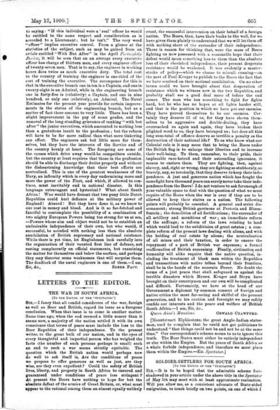LETTERS TO THE EDITOR.
THE WAR IN SOUTH AFRICA.
[TO THE EDITOR OF THE "SPECTATOR:1
13'31,-1 fancy that all candid considerers of the war, foreign as well as Boer and British, regard its issue as a foregone conclusion. When that issue is to come is another matter. Some time ago, when the end seemed a little nearer than it seems now, a majority of the nation settled it with its own conscience that terms of peace must include the loss to the Boer Republics of their independence. To the present writer, to the great bulk of our nation, and in the eyes of every thoughtful and impartial person who has weighed the facts (the number of such persons perhaps is small) such an end to such a war seems strictly equitable. The question which the British nation would perhaps now do well to ask itself is, Are the conditions of peace we propose to offer generous as well as just, are they wise, are they even expedient ? Could the safety of British lives, liberty, and property in South Africa be ensured and guaranteed under conditions of peace less stringent ? At present the Boers have nothing to hope for but the absolute defeat of the armies of Great Britain, or, what must appear to the rational among them an almost equally unlikely
event, the successful intervention on their behalf of a foreign nation. The Boers, then, have their backs to the wall, for we have given them plainly to understand that we will let them off with nothing short of the surrender of their independence. There is reason for thinking that were the mass of Boers fighting us now possessed with a reasonable hope that their defeat would mean something less to them than the absolute loss of their cherished independence, their present desperate resistance would be weakened. It was evidently a master- stroke of policy—which we choose to miscall cunning—on the part of Paul Kruger to publish to the Boers the fact that we have resolved on their national annihilation. On no other terms could we have brought about that desperation of resistance which we witness now in the two Republics, and probably shall see a good deal more of before the end comes. The man who has something to fight for fights hard, but he who has no hopes at all fights harder still, and that is the position in which we have put our enemies. They have proved themselves to be our enemies. Cer- tainly they deserve ill of us, for they have shown them- selves to be aggressive and double-dealing, they have overreached us again and again, they have broken their plighted word to us, they have betrayed us ; but does all this long sum-total of offence deserve so terrible a penalty as the destruction of their national life ? To us who know what our Colonial rule is it may seem that to bring the Boers under the British flag is to enlarge their liberties and to increase their well-being. To them, remember, to their pride, their implacable race-hatred and their astounding ignorance, it means to enslave them. They are fighting, then, against slavery, and, right or wrong, they are fighting so stubbornly, so bravely, nay, so heroically, that they deserve to keep their inde- pendence. A just and generous nation which has fought the same fight fora thousand years can surely never take their inde- pendence from the Boers! I do not venture to ask for enough of your valuable space to deal with the question of what we must require of the Boers when the war is over if they are to be allowed to keep their status as a nation. The following points will probably be essential. A general and strict dis- armament; strong British garrisons at Pretoria and Bloem- fontein ; the demolition of all fortifications ; the surrender of all artillery and munitions of war ; an immediate reform of the suffrage; a reform of the laws relating to land which would lead to the subdivision of great estates ; a com- plete reform of the present laws dealing with aliens, and with the holding of real estate by aliens; the neutralisation of all mines and their taxation, in order to ensure the repayment of a part of British war expenses ; a formal reaffirmation of British suzerainty. Finally, civilisation and humanity will alike require that the native question, in- cluding the treatment of black men within the Republics and transactions with native tribes beyond their frontiers, shall be in the hands of the suzerain Power. No doubt the terms of a just peace that shall safeguard us against the terrible disasters which Messrs. Kruger and Steyn have brought on their countrymen and our own will be complicated and difficult. Fortunately, we have at the head of our Government a diplomat by common consent of foreign and native critics the most far-seeing and skilful of the present generation, and to his caution and foresight we may safely confide our interests and the peace and welfare of British South Africa.—I am, Sir, &c.,
[fIountstuart Elphinstone, the great Anglo-Indian states- man, used to complain that he could not get politicians to understand "that things could not be and not be at the same time." Our correspondent's scheme seems to us to ignore this truth. The Boer States must either be entirely independent or else within the Empire. But the peace of South Africa as a whole forbids independence, and therefore we must place them within the Empire.—En. Spectator.]






































 Previous page
Previous page